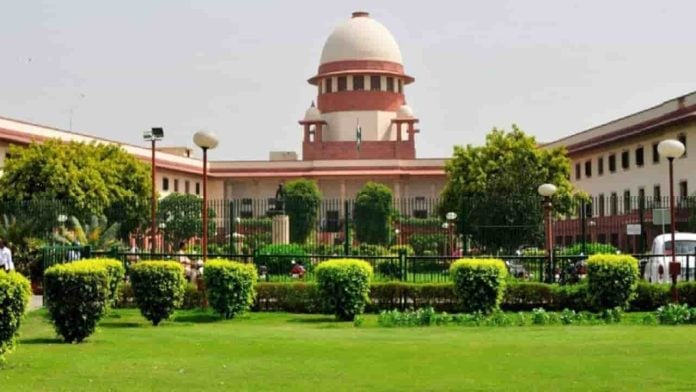The Supreme Court has formed a new Constitution Bench, which will hear four cases starting July 12.
Led by Chief Justice of India D.Y. Chandrachud, the Bench will comprise Justice Hrishikesh Roy, Justice P.S. Narasimha, Justice Pankaj Mithal and Justice Manoj Misra.
The cases to be listed before the Bench are:
1. Tej Prakash Pathak and Ors vs Rajasthan High Court and Ors
2. Central Organisation for Railway Electrification vs M/s ECI SPIC SMO MCML (JV) A Joint Venture Company
3. M/s Bajaj Allianz General Insurance Co Ltd vs Rambha Devi & Ors
4. JSW Steel Limited vs South Western Railway & Anr
1. Tej Prakash Pathak and Ors vs Rajasthan High Court and Ors
The matter was referred to the Constitution Bench by a three-Judge Bench in the case Tej Prakash Pathak and others vs Rajasthan High Court and others (2013) 4 SCC 540.
The High Court had doubted the correctness of an earlier decision delivered in the case K. Manjusree vs State of Andhra Pradesh and another (2008) 3 SCC 512, wherein it was held that the selection criteria could not be changed midway during the process as the same would amount to ‘changing the rules of the game’ after the game was played, which is clearly ‘impermissible’.
The Manjusree case had ruled that subsequent introduction of cut-off for the interview marks, which was not originally stipulated in the notification, was invalid.
The Apex Court will deliberate on whether the state instrumentalities can change eligibility rules after the selection process has begun.
It will further delve upon whether the criteria for appointment to a post can be altered by authorities concerned in the middle or after the process of selection has started.
2. Central Organisation for Railway Electrification vs M/s ECI SPIC SMO MCML (JV) A Joint Venture Company
In this case, the Supreme Court will delve upon whether in an application under Section 11 of the Arbitration Act, the courts can deviate from the agreed procedure of appointing arbitrators?
It will further deliberate on whether retired employees can be rendered ineligible to act as arbitrators in cases involving their former employers?
3. M/s Bajaj Allianz General Insurance Co Ltd vs Rambha Devi & Ors
The question referred to the Constitution Bench in this case is whether a person holding a driving licence in respect of a light motor vehicle (LMV), could on the strength of that licence, be entitled to drive a transport vehicle of light motor vehicle class having unladen weight not exceeding 7500 kg?
The question was referred as there were some variances in terms of the eligibility to get a licence under the two categories, as per various provisions of the Motor Vehicles Act.
In March last year, a three-judge Bench of then Justice U.U. Lalit, Justice Ravindra Bhat and Justice P.S. Narasimha had doubted the correctness of the decision given by a coordinate bench in the case Mukund Dewangan vs Oriental Insurance Company Limited (2017) 14 SCC 663.
A three-Judge Bench had held in the Mukund Dewangan case that a person holding a driving licence in respect of a light motor vehicle, could on the strength of that licence, be entitled to drive a transport vehicle of light motor vehicle class having unladen weight not exceeding 7500 kg.
The Bench of Justice Amitava Roy, Justice Arun Mishra and Justice Sanjay Kishan Kaul had further held that a separate endorsement in the LMV driving licence was not required to drive a transport vehicle having unladen weight below 7500 kg.
4. JSW Steel Limited vs South Western Railway & Anr
The main issue in the case is related to whether a person, who is himself ineligible to be appointed as an arbitrator, can appoint an arbitrator?
In the JSW Steel Limited vs South Western Railway & Anr case, a three-Judge Bench led by then CJI U.U. Lalit had noted that the view taken by the two-Judge Bench in the Central Organisation for Railway Electrification vs M/s ECI SPIC SMO MCML (JV) A Joint Venture Company was doubted by a 3-judge bench led by Justice Nariman in January 2021 in the case Union of India vs Tantia Constructions.
Taking note of this, the Bench in JSW Steel also referred the matter to a three-Judge Bench, observing that since the issue had been recurring, it would be in the fitness of things that the question was resolved at an early date.


